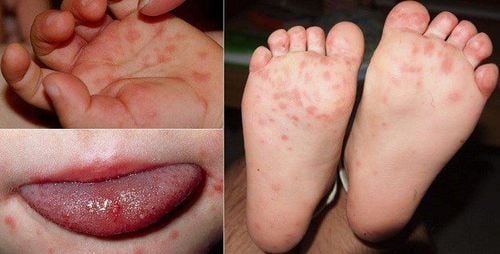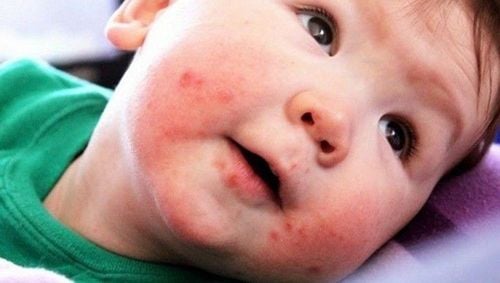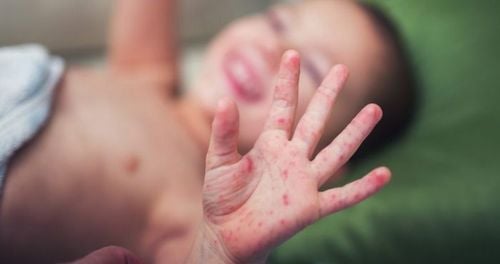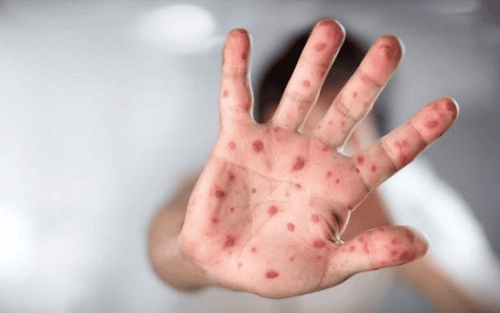This is an automatically translated article.
The weather factor, the children's habit of keeping their hands in their mouths and contact with dirty toys have made hand, foot and mouth disease a very common disease in our country today. The fact that hand, foot and mouth disease in young children goes away in a few days is also a concern of many parents.1. Overview of hand, foot and mouth disease
Hand, foot and mouth disease is an infectious disease that spreads from person to person, caused by an intestinal virus and easily breaks out into an epidemic. The disease is mainly transmitted by the gastrointestinal tract with the main source of transmission being saliva, blisters on the skin and feces of infected children. In fact, in the pediatric wards, the number of relatives visiting the patient and caregivers is very large, but very few people wash their hands before leaving. These objects can become the cause of continuing to spread the disease to the community.
The disease can occur at any age, but is common in preschool to under 10 years old because children often have a habit of putting their hands in their mouths. In Vietnam, hand, foot and mouth disease occurs sporadically almost all year round. In which, in the period from March to May and September to December, there was a marked increase in the number of hand, foot and mouth infections in young children.
2. Hand, foot and mouth symptoms in young children
Mouth ulcers and blisters on hands and feet are typical symptoms to help differentiate hand-foot-and-mouth disease in young children. Other specific signs are:
At first, your child will have symptoms similar to those of a cold, including a low or high fever, fatigue, sore throat, poor appetite, sometimes vomiting, and some diarrhea. times a day; After that, ulcers 2 - 3 mm in diameter appear on the oral mucosa, gums and tongue, causing the child to have mouth pain, refuse to eat or drink, and increase salivation; There is also a blister-like rash on the palms and soles, which sometimes also appears on the knees and buttocks in swaddled infants. The vesicles are short-lived (< 7 days), may or may not leave a deep scar after diving, and very rarely are superinfected with cloudy fluid.
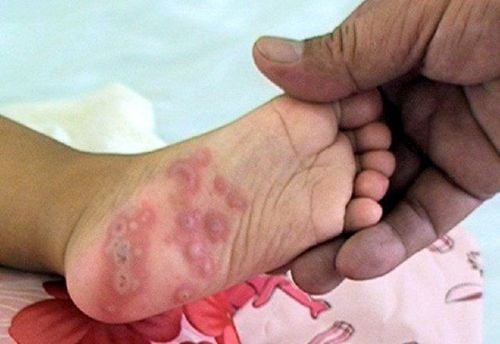
Lòng bàn chân trẻ có phát ban dạng phỏng nước là triệu chứng điển hình của bệnh tay chân miệng
How many days did the baby have hand, foot and mouth disease? For hand, foot and mouth disease in children, children with mild form and with proper care will recover and recover completely after 8-10 days. In case of severe progression, the patient is at risk of facing neurological complications, respiratory - circulatory failure, ... even leading to death if not treated promptly. The subjectivity of parents can cause children to have dangerous complications and especially develop very quickly within just a few hours. Therefore, it is necessary to monitor for warning signs of worsening disease as follows:
High fever that does not go down, body temperature above 38.5 degrees Celsius for more than 48 hours and does not respond to paracetamol antipyretic. It is likely that a very strong inflammatory response in the body causes neurotoxicity. At this time, the child needs to be taken to the hospital for monitoring and using a more special antipyretic drug (Ibuprofen); The patient will cry continuously for a long time, all night sleep only for 15-20 minutes, wake up and continue to cry abnormally; Children who are often startled, while sleeping, suddenly raise their hands, which is a warning sign of very dangerous neurotoxic complications. Parents need to pay attention to how often children startle, even while playing, to promptly notify the doctor.
3. Taking care of hand, foot and mouth disease in young children
For the case of a child with hand, foot and mouth disease with sores and erythema vesicles, but only a mild fever (< 38.5 degrees Celsius), still awake to play, usually an outpatient treatment is prescribed by the doctor. . Parents need to give their children fever-reducing and pain-relieving medications, and multivitamin supplements as prescribed by a doctor. Specifically, when the child has a fever > 38 degrees Celsius, the fever should be reduced with oral Paracetamol, the dose is 10-15 mg/kg/time, repeat after 4-6 hours if the fever returns.
In addition, it is necessary to develop adequate nutrition according to age needs, choose easy-to-digest liquid foods, avoid acidic foods,... In infants, continue to breastfeed as usual. , you can increase the feed if you see that the baby sucks less.
If hand-foot-and-mouth disease in young children causes severe sore throat due to large sores, a milky emulsion can be consulted (phosphalugel, varogel or trimafort, ...). Give the child this medicine 1-2 ml / time to ease the pain before eating. After eating, you also need to clean your teeth.
Because hand, foot and mouth disease in young children is a contagious disease, so parents should keep their children away from school, just to rest at home, avoid stimulation, and isolate from other friends.
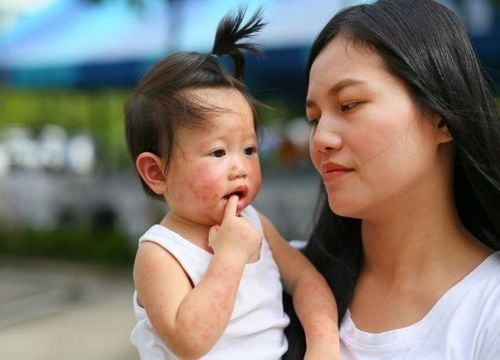
Trẻ mắc tay chân miệng cần được cách lý với các trẻ khác
4. Signs you need to take your child to the hospital
When a child with hand, foot and mouth disease is being monitored at home and has one of the following warning signs of complications, the child must be taken to the hospital immediately, even at night:
High fever; Shortness of breath, shortness of breath; Constant crying; Do not sleep or doze off, doze off; Startled, startled, confused; Sitting unsteadily, staggered; tremors or convulsions; Sweating; Vomiting a lot, skipping meals/feeding; Weakness in limbs; Skin discoloration, purple or bluish. Note, even though they are treated as outpatients, parents must also take their children to the doctor for re-examination every 1-2 days in the first 8-10 days of illness. If there is a fever, it is necessary to monitor every day until the child's hand, foot and mouth disease is fever free for at least 48 hours.

Trẻ sốt cao li bì, chân tay yếu đi, da tím tái cần đưa trẻ đến bệnh viện ngay
5. Prevention of hand foot mouth in young children
So far there is no vaccine as well as specific medicine to treat hand, foot and mouth in young children. Therefore, it is important for caregivers to take the initiative to prevent general illness by:
Wearing a mask, maintaining personal hygiene, washing hands with soap, especially after changing clothes, diapers, removing feces, the patient's saliva and bed linen;
Wash toys and items, wipe doorknobs, handrails and floors with an antiseptic cleaning solution; Eat cooked, drink boiling, ensure hygiene; Do not chew or give food to the child; Do not let children share personal items such as towels, cups, cups, spoons, toys...; Isolation of sick children at home, do not go to school or go to public playgrounds for the first 10-14 days of illness. Hand, foot and mouth disease in children can be completely cured without leaving any sequelae if properly cared for. However, being subjective in disease prevention and treatment can still put children in danger. Therefore, parents with sick children need to carefully monitor their children to promptly detect abnormal signs. If so, they must quickly bring the patient to the nearest medical facility for examination and treatment.
If you have unusual symptoms, you should be examined and consulted with a specialist.
Please dial HOTLINE for more information or register for an appointment HERE. Download MyVinmec app to make appointments faster and to manage your bookings easily.




